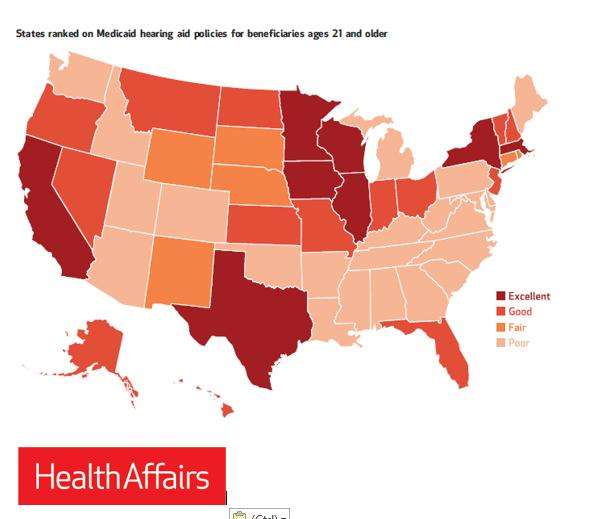Medicaid coverage brings more silence to the hearing impaired

Medicaid does not cover hearing aids in 22 states. Coverage varies greatly in the remaining 28 states based on the degree of hearing loss and types of benefits available. Such inconsistencies exist as the federal government does not require Medicaid to cover hearing aids for adults, allowing individual states to set its own guidelines.
"Medicaid Hearing Aid Coverage for Older Adult Beneficiaries: A State-by-State Comparison" published in the August issue of Health Affairs is the first comprehensive review of state-level Medicaid coverage. Lead author Michelle Arnold, Au.D.. CCC-A, University of South Florida, used six criteria to rank Medicaid's coverage policies in older adult beneficiaries.
- Eligibility of assessment and treatment
- Two hearing aids
- Batteries
- Supplies
- Follow-up and rehabilitation
- Repairs or replacement
Medicaid in 12 of the 28 states (CA, IL, IN, MN, MO, NH, NV, NY, OH, SD, TX and VT) covers hearing aids if the patient is considered to have "mild" or greater hearing loss, such as difficulty understanding soft speech when there's a lot of background noise, like in a restaurant. "Moderate" or greater hearing loss is required in six states (FL, MT, NJ, ND, OR and WY), which can be problematic in most conversational settings. Six other states (HI, IA, MA, NE, RI and WI) rely on opinions from audiologists and physicians, as there aren't any standards. There's nothing in the guidelines that suggest criteria for hearing loss severity in four states (AK, CT, KS and NM).
Nearly 30 million Americans over 50-years-old suffer hearing loss and that number will only increase as the population continues to age. Just 25% with moderate to severe hearing loss currently wear a hearing aid as they're cost prohibitive to those on a fixed income. Depending on the level of technology, aids cost $3,000-$6,000 out of pocket and must be replaced every 4-6 years.
"Lack of hearing aid uptake is a public health concern, as untreated age-related hearing loss, with its concomitant reductions in speech understanding is associated with increased risks of social isolation, falls, hospitalizations and cognitive decline and with a disease burden of up to four disability-adjusted life years," said Arnold.
Arnold concludes hearing aids and related services should be a federally mandated benefit for adult Medicaid beneficiaries in all 50 states, helping prevent additional costs and reduce the effects of adverse health conditions.












